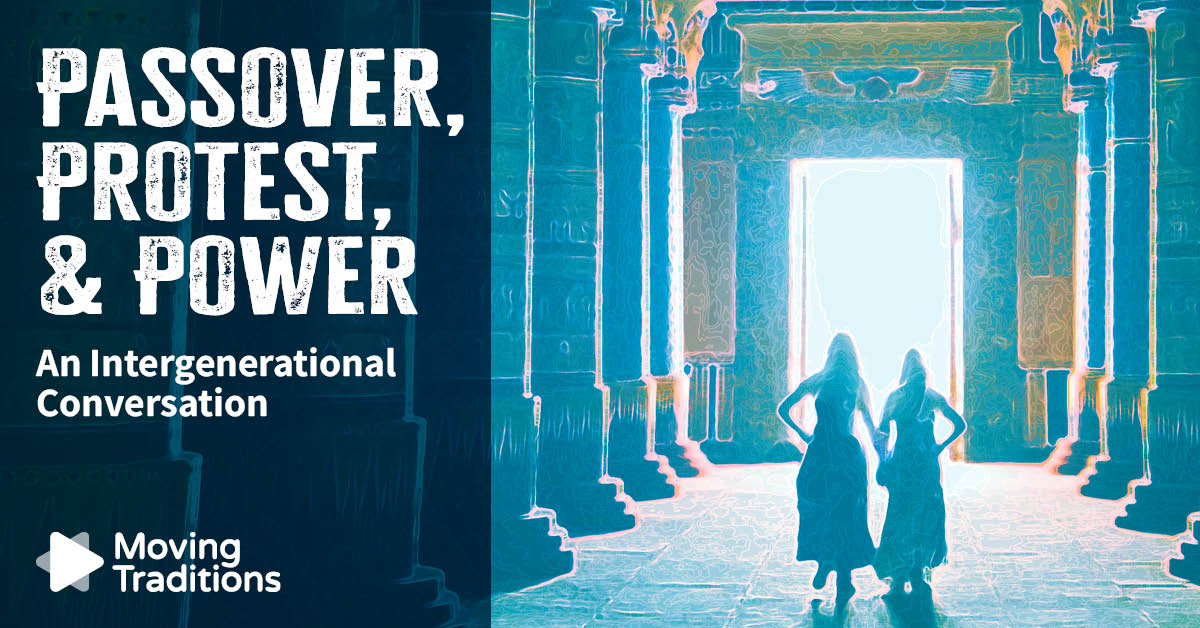
From all of us at Moving Traditions, chag Pesach sameach / happy Passover!
We encourage you to use the text and questions in this resource to spark an intergenerational conversation during the maggid/story section of your seder.
INTRODUCTION
Since our earliest history, Jews have challenged authority. We have challenged God and governments, either overtly or in subtler acts of sabotage, from Abraham openly arguing with God about the plan to destroy an entire city, to Yocheved quietly hiding baby Moses from Pharaoh’s genocidal decree.
Yet, since our earliest history, Jews have also accepted authority with humble, unquestioning obedience. Our very archetype of principled protest, Abraham himself, meekly complies when God commands he sacrifice his own child. As much as he is some ancestral proto-activist speaking truth to power, Abraham is also the paragon of wordless obedience.
When should we defy authority, and when should we obey? When should we raise our voices to the sky to make demands like Abraham did once, and when should we work behind the scenes, maintaining plausible deniability, like Yocheved?

Sometimes we might break a rule for our own benefit, like staying past curfew because we want to keep having fun with friends. Other times we might break a rule on principle, because the rule we were asked to follow violates a sense of right and wrong.
Have you ever disobeyed a rule or an authority figure based on your own sense of right and wrong?
Share your story with the table or tell it to the person next to you.

Worried that an army of Jews will one day overthrow his country, Pharaoh plots to kill all the future soldiers (in this case, boys) before they can grow up.
The king of Egypt spoke to the Hebrew midwives, one of whom was named Shifra and the other Puah, saying, “When you deliver the Hebrew women, look at the birthstool: if it is a boy, kill him; if it is a girl, let her live.”
וַיֹּאמֶר מֶלֶךְ מִצְרַיִם לַמְיַלְּדֹת הָעִבְרִיֹּת אֲשֶׁר שֵׁם הָאַחַת שִׁפְרָה וְשֵׁם הַשֵּׁנִית פּוּעָה׃ וַיֹּאמֶר בְּיַלֶּדְכֶן אֶת־הָעִבְרִיּוֹת וּרְאִיתֶן עַל־הָאׇבְנָיִם אִם־בֵּן הוּא וַהֲמִתֶּן אֹתוֹ וְאִם־בַּת הִוא וָחָיָה׃
The midwives, fearing God, did not do as the king of Egypt had told them; they let the boys live.
וַתִּירֶאןָ הַמְיַלְּדֹת אֶת־הָאֱלֹהִים וְלֹא עָשׂוּ כַּאֲשֶׁר דִּבֶּר אֲלֵיהֶן מֶלֶךְ מִצְרָיִם וַתְּחַיֶּיןָ אֶת־הַיְלָדִים׃
So the king of Egypt summoned the midwives and said to them, “Why have you done this thing, letting the boys live?”
וַיִּקְרָא מֶלֶךְ־מִצְרַיִם לַמְיַלְּדֹת וַיֹּאמֶר לָהֶן מַדּוּעַ עֲשִׂיתֶן הַדָּבָר הַזֶּה וַתְּחַיֶּיןָ אֶת־הַיְלָדִים׃
The midwives said to Pharaoh, “Because the Hebrew women are not like the Egyptian women: they are vigorous. Before the midwife can come to them, they have given birth.”
וַתֹּאמַרְןָ הַמְיַלְּדֹת אֶל־פַּרְעֹה כִּי לֹא כַנָּשִׁים הַמִּצְרִיֹּת הָעִבְרִיֹּת כִּי־חָיוֹת הֵנָּה בְּטֶרֶם תָּבוֹא אֲלֵהֶן הַמְיַלֶּדֶת וְיָלָדוּ׃
And God dealt well with the midwives; and the people multiplied and increased greatly.
וַיֵּיטֶב אֱלֹהִים לַמְיַלְּדֹת וַיִּרֶב הָעָם וַיַּעַצְמוּ מְאֹד׃
And [God] established households for the midwives, because they feared God.
וַיְהִי כִּי־יָרְאוּ הַמְיַלְּדֹת אֶת־הָאֱלֹהִים וַיַּעַשׂ לָהֶם בָּתִּים׃
Then Pharaoh charged all his people, saying, “Every boy that is born you shall throw into the Nile, but let every girl live.”
וַיְצַו פַּרְעֹה לְכׇל־עַמּוֹ לֵאמֹר כׇּל־הַבֵּן הַיִּלּוֹד הַיְאֹרָה תַּשְׁלִיכֻהוּ וְכׇל־הַבַּת תְּחַיּוּן׃
— Shemot (Exodus) 1:15-22

Discuss as a group or in pairs. We recommend pairing up people from different generations for this discussion! Think back to some of the stories you heard from other guests about their own acts of disobedience as you consider the questions below.
- How do you think “fearing God” (or recognizing a higher power/value system) might explain the midwives’ disobedience?
- Why do you think the midwives lie to Pharaoh instead of being open that they are disobeying him because they disagree?
- Does your belief in a higher power or value system fuel your desire to obey or disobey authority? Why or why not?
- In general, when do you think it is better to protest openly? When is it better to disobey quietly?
- Notice that the midwives’ actions were not entirely effective. Pharaoh’s next order is arguably even crueler: throw the boys into the Nile. Do you think disobedience or protest is still worthwhile if it doesn’t have its intended effect? Why or why not?

Invite everyone to share this blessing, filling in the blank with their own adjectives or phrases (such as courageous or discerning):
“May we be ___, like Shifra and Puah.”
Donate
Your gift to Moving Traditions emboldens Jewish youth to thrive through the pursuit of personal wellbeing (shleimut), caring relationships (hesed), and a Jewish and feminist vision of equity and justice (tzedek).
